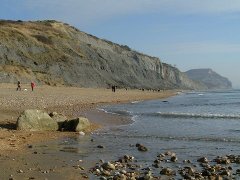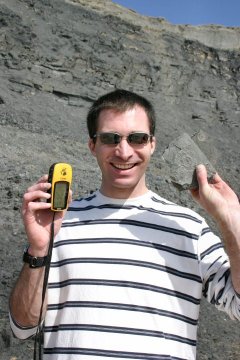
By seeking this or any other cache placed
by myself or maintained by me you accept responsibility for your
own safety. Caching can be dangerous. Assess the risk for yourself
before seeking this cache!
Unfortunately for dog owners there are restrictions on dogs on
Charmouth beach at certain times of the year. Dogs are not allowed
on Charmouth's West Beach between 1st May and 30th Sept, at any
time. Dogs are not allowed on East Beach between 1st July and 31st
Aug 10am to 6pm.
Fossils are the remains of animals and plants that have been
preserved in stone. They provide direct evidence of past life on
Earth and the way in which it has been changed over millions of
years.
The rocks that make up the cliffs at Charmouth are rich in
fossils of animals that swam in the Jurassic seas 180-195 million
years ago. The eroding coastline results in thousands of fossils
being fed onto the beaches from the landslides in the surrounding
cliffs.
The fossils that have been found here since the 18th century
represent one of the richest slices of life in Jurassic times
anywhere in the world. It is because of this that UNESCO awarded
the World Heritage status to the area. This puts this coastline in
the same league as the Grand Canyon.
Charmouth is one of the safest places to look for fossils. It is
recommended to look amongst the rocks and pebbles on the beach when
the tide is falling. Common finds are ammonites and belemnites. If
you are lucky, you might find a piece of ichthyosaur bone.
 When
hunting for fossils you should always follow the fossil
finders code of conduct. The highlights of which are:
When
hunting for fossils you should always follow the fossil
finders code of conduct. The highlights of which are:
Do
not over collect, leave some for others.
Collecting from fallen or beach material is acceptable
practice.
Digging in the cliffs is NOT acceptable practice.
In exceptional cases permission can be obtained to extract large
fossils from the cliffs. You must obtain permission from the land
owner.
If you find a special or rare fossil please register it at
Charmouth Heritage Coast Centre.
The full text of the fossil collectors code of conduct is
available here: Code of Conduct.
To log this cache I am asking you to go to the beach at
Charmouth and find a fossil, measure it, and also tell me exactly
what sort of fossil it is. You can find the information from either
the visitor centre or the information boards nearby. Whilst there,
you must also take a photograph of you, your GPS and the
fossil that you have found at Charmouth beach that day and upload
it to this page. With effect from October 20th, 2006, any logs
without the type, the size, and the supporting photographs will
unfortunately be deleted. These requirements are due to the
educational emphasis that the Earthcache cache type has been
designed for.
I’d suggest that you start off in the Charmouth Heritage
Coast Centre as they provide information and advice on the safe
collection of fossils and will have examples so you know what you
are looking for. The centre has free admission, and they have a
website where you can do some research before your trip: Charmouth Heritage Coast Centre.
Good luck, and above all, enjoy your time in Charmouth fossil
hunting!
